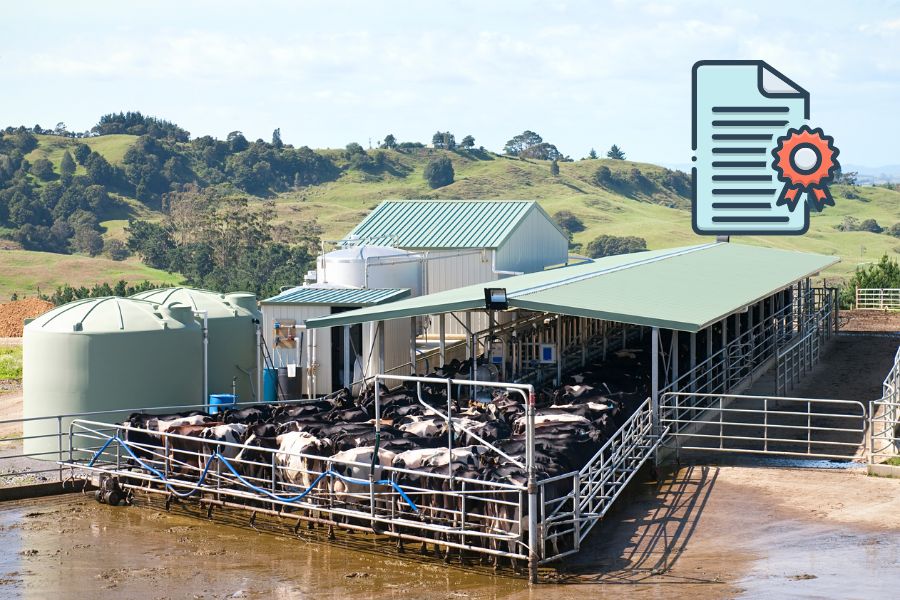A dairy farm can be lucrative, but, like any other business, the legal hoops and red tape can be daunting. It can be even more daunting in the United States because you must follow federal, state, and county laws, which can differ from region to region. So, with all of this, how can you register your dairy farm in the US?
To register a dairy farm in the US, follow these steps:
- Get advice from local farmers about possible pitfalls.
- Contact the USDA to get information and assistance.
- Decide on a legal entity and register your business.
- Apply for appropriate dairy farming licenses.
- Renew your license annually.
Registering your dairy farm isn’t the easiest thing you’ll do as a farmer. First, you must check the local laws because they vary between states. The process can be a bit complex, and there are many variables that aren’t always predictable, but if you follow these steps, you will have a licensed and registered dairy farm as painlessly as possible.

1. Consult With Experts Before You Register Your Dairy Farm
When starting a new dairy farm in the US, it's important to seek guidance from those who have successfully gone through the registration process before. This is because registering a dairy farm involves various legal and regulatory requirements that can overwhelm a first-time farmer.
By following the steps and advice of experienced farmers who have navigated the process, you can avoid common mistakes and streamline the registration process. Whether it's seeking advice from industry associations or consulting with legal professionals, learning from others can help you register your new dairy farm with confidence and start your business off on the right foot.
Similarly, going to events like field days and open houses hosted on dairy farms will put you in contact with farmers, vets, bankers, educators, and others who will know about the requirements for registering a dairy farm in your area.
They can tell you precisely what to do and where to go to avoid making common mistakes. Get as many recommendations as you can from these experts, as that will make your life as painless as possible.
A frequent question on this point is, wouldn't that make it more difficult? Won't the farmers be wary of sharing information out of fear of creating competition?
Though that might be true in some cases, most farming communities aren't all that concerned about competition. Farmers tend to help each other a lot, even though they might be competing in the same industry. But that's also why you must ask as many dairy farmers as possible. Even if you get lousy guidance from one, the others will set it right.
2. Contact The USDA
The United States Department of Agriculture is an organization established by the federal government to regulate farming practices and establish basic guidelines that farmers in all states must hold to, regardless of local legislation.
The USDA has local service centers in all states. The service centers can offer proper guidance based on state laws and often provide the documents you need to register your dairy farm. It also employs Beginning Farmer and Rancher Coordinators tasked with guiding new farmers through the process, evaluating the land, and making recommendations on getting started quickly and painlessly.
3. Register Your Business
You should spend the time and money to talk to an accountant and a lawyer about the different business options available. They will also be able to help you register your chosen business type. Apart from non-profit organizations, there are four popular business types that farmers generally prefer. Each has its pros and cons. Briefly, they are:
Business Type | Pros | Cons |
|---|---|---|
Sole Proprietorship |
|
|
General Partnership |
|
|
Limited Liability Partnership |
|
|
Limited Liability Company |
|
|
4. Apply For Your Dairy Farm License
You must work through your local state government or the US Department of Agriculture to apply for a license registration for your dairy farm. Some states, like Texas, supply the documents on the state government website with step-by-step instructions on how to make payment and submit your application.
Different states have different requirements for license applications. A few examples include the following:
New York
Dairy farms in New York don't have to apply for a dairy producer's license based if they meet the following conditions.
- If they handle 3,000 pounds of milk or less per month
- If they distribute packaged fluid milk that's processed at another plant by another operator
- If they operate a plant that handles milk produced on their own farm, which requires another type of license (a Producer-Dealer license)
In some cases, you may also have to apply for a 20-C Food Processor license, which deals with handling potentially hazardous foods, including milk.
Texas
Texas doesn't have exemptions for dairy farms, and all farms must have a license to operate in the state. You could get fined up to $25,000 per infraction for each day you operated a dairy farm without a license, so it's not something you should take lightly. Those kinds of fines could cause you to lose your farm entirely.
The License Application Process
The precise application steps will differ from state to state, but it generally follows along these lines:
1. Get the application forms. You can obtain them in a few ways:
- Some states, like Texas, have them available to download from their websites, so always check your state government's website first.
- You can obtain printed copies in person from state health or agriculture offices.
- If the offices are too far away, you can contact those offices and request that they mail the forms to you.
- The USDA can provide you with the necessary license application forms for your state and even help you to complete and submit the documents.
2. Complete the license application documents. There are a few crucial points to keep in mind:
- All owners or partners in your business must sign the application forms. In the case of a Sole Proprietorship, only you have to sign.
- The forms require a physical location for the farm, so that detail should already be sorted out before you apply for the license.
- If you have already started your dairy farm operations, you should add the starting date to the application forms before submitting them.
3. Make payment:
- The exact amount varies between states, so it's best to check with the local offices to confirm. However, remember that you need to pay for an entire year's license, including the pro-rated amount for the time you've been in operation if you have already started. This amount is non-refundable.
4. Submit your application. All the forms, along with your proof of payment and any other supporting documents, can be submitted in one of the following ways:
- You can hand everything in at the offices in person.
- You can mail all the required documents to the local offices.
Most states say that it could take four to six weeks (after they receive all of your documentation, including payment) for them to complete your license application. During this time, they might request to come and inspect the premises and discuss your application with you in person, though that doesn't often happen in most states.
To make things much easier for yourself, ensure you complete the documents in detail. If the state office finds any information missing or incomplete, they will return the forms to you, stating what else they require, causing unnecessary delays.
After they send the documents back, you usually have up to 135 days to return everything pertaining to your application to the office. If they do not receive the documents within this time, including everything that was missing, they will consider your application withdrawn. You will have to start an entirely new application and make the payment again since the fee is non-refundable.
5. Renew Your License Annually
All dairy farm licenses are valid for one year, though expiration dates vary from state to state. While most states' dairy farm licenses expire on the anniversary of their approval date, some states, like New Hampshire, have licenses that are valid for one calendar year and expire every January 1st. So, just to be sure, check the expiration date on your license document.
Some states (like Texas) allow you to renew your dairy farm license online, though many still need you to complete and send printed documents in person. The renewal process is usually much faster than the initial application unless there are problems with your documents or if there were irregularities with your farm over the last year.
Once the department has your renewal application and proof of payment, they will issue your license and mail it to the address and contact person on the original application. Be sure to inform them if any of that information has changed since you applied.
Conclusion
In summary, registering your dairy farm in the US requires establishing a business entity, submitting a license application, and renewing your license. While these are the only legal requirements, it's crucial not to overlook the first two steps mentioned earlier. Seeking guidance from local farming experts and the US Department of Agriculture can help you understand what to expect and provide tips to expedite the registration.
Remember, registering your dairy farm is not only necessary to comply with the law but also helps ensure the safety and quality of your products. So, take the time to do it right and seek expert advice if needed.
